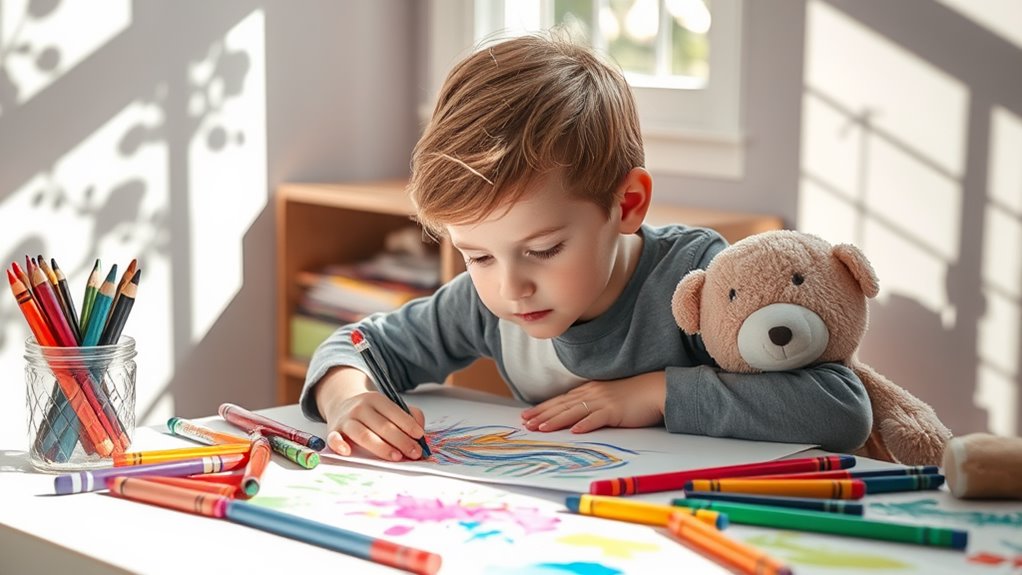Recognizing Signs of Behavioral Issues in Children
When you observe a child displaying unusual behaviors, it’s essential to reflect on the broader context of their emotional and social environment. Signs like mood swings, withdrawal, or difficulty in following directions can indicate deeper issues that might require attention. You might find yourself wondering how to differentiate between typical childhood behavior and something more concerning. Understanding these nuances can be pivotal in providing the right support, yet many parents find themselves unsure of the next steps to take. What if you could identify these signs early and make a meaningful difference?
Understanding Behavioral Issues
Understanding behavioral issues in children is essential for fostering their emotional and social development. When you notice a child acting out, it’s important to dig deeper. These behaviors often signal something more than just a bad day or a sugar rush.
Kids express feelings through actions, and sometimes they don’t have the words to explain what’s going on inside their heads. You might see signs of stress, anxiety, or frustration. For instance, a child may throw tantrums or withdraw from friends.
It can be confusing, and you may wonder what’s causing these outbursts. But remember, every child is unique. One child’s reaction to stress might be to act silly, while another might become quiet and shy.
Common Signs in Toddlers
When it comes to recognizing behavioral issues in toddlers, specific signs can help you identify when a child might be struggling. You might notice that your little one has intense mood swings that seem out of the ordinary. One moment, they could be giggling, and the next, they’re having a full-blown meltdown over a toy. It’s like trying to predict the weather in spring!
Another common sign is difficulty following directions. If your toddler often ignores simple requests, like “Please put your shoes away,” it might be a red flag.
You should also pay attention to how they interact with others. If they frequently hit or push other kids during playtime, it’s time to step in and teach them about sharing and kindness.
Finally, if you notice changes in sleep or eating habits, those can also indicate behavioral issues. Is your toddler suddenly waking up multiple times at night or refusing to eat?
These shifts could signal that something’s off. Remember, being aware of these signs can help you support your child better. And who knows? With a little patience, you might just turn those stormy tantrums into sunny days!
Warning Signs in Preschoolers
As toddlers grow into preschoolers, their behavior can evolve, and new warning signs may emerge. It’s crucial to pay attention to how your little one interacts with others and the world around them. For instance, if they suddenly start having tantrums over small things or seem overly aggressive, it might be worth investigating further. While all kids have their moments, consistent outbursts can indicate deeper issues.
Another warning sign is extreme shyness or withdrawal. If your preschooler avoids playtime with peers or clings to you in social situations, they might be struggling with anxiety.
And don’t forget about their ability to express emotions; if they frequently seem frustrated or angry, it could be a sign they’re having trouble managing their feelings.
Also, watch for changes in sleep or eating habits. If your child’s appetite fluctuates drastically or they’ve trouble sleeping, it might be worth a chat with a pediatrician.
Red Flags in School-Aged Children
At school, your child’s behavior can reveal a lot about their emotional well-being. If you notice sudden changes, like withdrawing from friends or acting out more than usual, these might be red flags. You should pay attention to how they interact with teachers and classmates. If they often seem angry or overly frustrated, it could indicate deeper issues.
Also, keep an eye on their academic performance. If grades are slipping or they’re avoiding schoolwork, it’s worth investigating. Kids sometimes struggle silently, and poor grades can be a sign that something’s bothering them.
Another thing to watch for is trouble following rules. If your child frequently faces discipline issues, it mightn’t just be typical mischief; they could be dealing with something more significant.
And remember, while some kids are naturally more energetic or stubborn, a noticeable change in behavior, like becoming overly anxious or having frequent tantrums, isn’t just a phase.
Trust your instincts. If something feels off, don’t hesitate to reach out to teachers or school counselors for support. You’re your child’s best advocate, and being proactive can make a big difference!
Emotional Indicators to Watch
Observing your child’s emotional state can provide valuable insights into their overall mental health. It’s like being a detective, searching for clues that show how they really feel. Pay attention to sudden mood swings—if your child goes from happy to sad faster than you can say “ice cream,” it might be a sign of something deeper.
Also, notice if they seem unusually anxious or worried, even about little things. It’s normal to feel nervous sometimes, but if it’s happening a lot, it’s worth looking into.
Another indicator is how they express their feelings. Are they often angry, frustrated, or tearful? Kids sometimes struggle to put their feelings into words, so you might see it come out in behaviors instead.
And let’s not forget about their energy levels! If they seem unusually tired or withdrawn, it could be a sign they’re dealing with something emotionally heavy.
Social Interaction Challenges
Social interaction challenges can manifest in various ways, and recognizing them early can make a significant difference. You might notice your child avoiding eye contact or hesitating to join in games with others. They may struggle to take turns during playtime or seem unsure about how to start a conversation. These signs can be tricky to spot, especially if you’re not sure what to look for.
Sometimes, kids might get anxious in social settings, feeling overwhelmed by too many people or loud noises. This can cause them to withdraw or act out in frustration. They might also have a hard time understanding social cues, like when a friend is joking or feeling upset. It’s like trying to decode a secret language!
If you see these behaviors, don’t panic. It’s important to support your child by practicing social skills at home. Role-playing different scenarios can help them feel more comfortable.
Encouraging playdates with familiar friends can also boost their confidence. Remember, every child develops at their own pace, and with your support, they can learn to navigate social interactions more easily. After all, making friends should be fun, not a puzzle!
Changes in Academic Performance
When it comes to changes in academic performance, subtle shifts can often signal underlying behavioral issues. If your child suddenly starts bringing home grades that don’t match their usual standard, it’s worth paying attention. You might notice they’re turning in assignments late or not at all. Maybe they seem disinterested in subjects they once loved.
These changes can happen for various reasons. Sometimes, kids struggle with attention or focus, making it hard for them to keep up in class. Other times, anxiety or frustration can creep in, causing them to avoid schoolwork altogether. If your child’s grades drop, it might feel like a red flag waving at you!
You shouldn’t jump to conclusions, though. Talk to your child about how they feel about school. Maybe they’re dealing with friendship issues or just feeling overwhelmed. Being supportive and understanding can help them open up.
Impact of Environmental Factors
Throughout a child’s development, environmental factors play an essential role in shaping their behavior and emotional well-being. Think about it—where your child spends their time can really influence how they act. If they’re in a loving, supportive environment, they’re more likely to develop good social skills and self-esteem.
But if they’re surrounded by tension or chaos, that can lead to frustration and behavioral issues.
You might notice that kids in stable homes with routines tend to feel more secure. They know what to expect, which helps them manage their emotions better.
On the flip side, constant changes, like moving homes or switching schools, can upset their sense of stability. Even the people they hang out with can make a difference! Friends who encourage positive behavior can boost your child’s confidence, while negative influences can lead them down the wrong path.
When to Seek Professional Help
Recognizing the signs of behavioral issues in your child can be challenging, especially when external factors like environment impact their development.
You might notice your little one acting out more than usual, or maybe they seem sad and withdrawn. It’s important to pay attention to these changes. If their behavior disrupts daily life—like school, friendships, or family time—it’s time to think about seeking professional help.
Also, if you notice intense emotions, like extreme anger or anxiety, that seem hard for them to manage, don’t hesitate to reach out. Sometimes kids just need a little extra support.
You know your child best, so trust your instincts. If you feel overwhelmed or unsure, talking to a doctor, therapist, or counselor can provide clarity. They can help you understand what’s going on and suggest next steps.
Strategies for Support and Intervention
Your child’s well-being can greatly benefit from a supportive environment and effective intervention strategies. Start by creating a safe space where your child feels comfortable expressing their feelings. Encourage open conversations, and let them know it’s okay to share their thoughts without judgment. Sometimes, kids just need someone to listen!
Next, establish routines. Predictable schedules can help your child feel more secure and less anxious. Try setting up a consistent homework time or family dinner. This predictability can work wonders!
Don’t forget to celebrate small victories! Praise your child for their efforts, whether they’re big or small. Positive reinforcement boosts their confidence and motivates them to keep trying.
You might also consider involving them in activities they enjoy. Sports, arts, or even simple games can be great outlets for stress and frustration. Plus, they can build friendships, which is super important!
Lastly, don’t hesitate to seek professional help if needed. Sometimes, a specialist can provide additional support that makes a big difference.




